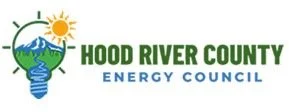The Gorge Clean Energy Coalition
We know that you care about the Gorge, and your community leadership and influence are important elements of the solution.
Background: In 2018 Hood River County adopted a prescient Energy Plan, Goal 1 of which is to reduce fossil fuel usage by 30% by 2030, 50% by 2040, and 80% by 2050. These reductions correspond to annual energy savings of around $12 million, $25 million, and $52 million, respectively--who doesn’t want to save millions? And increase resilience and reduce toxic and climate emissions?
However, as of 2025, we’ve reduced the county’s fossil fuel usage by less than 3%. The main fossil-fuel users are households and businesses who could be reaping those savings but haven’t yet adopted the clean-energy (electrified) options. The Hood River County Energy Council, a volunteer group who advise local municipalities and community partners on implementing the Plan, recently teamed with the Columbia Gorge Climate Action Network to build a wide coalition to tackle Goal 1 with much more public education and outreach. Electrify Oregon's coaching network is a key contributor to the coalition, Sustainable Northwest will be collaborating on community engagement plans, and we expect more groups in the Gorge to join as this Gorge Clean Energy Coalition evolves, hopefully also spreading to Klickitat and Wasco Counties.
How you can participate: Your leadership and your electrification experiences are critical to accelerating the clean-energy transition. Many of you have already electrified some of your house or vehicles. We want you to collaborate on spreading the word about your experiences, post an “Electrified Household” yard sign, or host a short open house to share your experiences with your heat pump, electric vehicle, solar panels, or whatever. We want more people using transit and active transportation modes. We want businesses to talk about their electrified fleet or buildings. A main activity of the coalition will be bimonthly or quarterly electrified open houses or businesses that include expert presentations and real-world experiences of neighbors. Resources for coaching and incentives are also available for households of most income levels. And we could use more electrification coaches, if you are a volunteer with deeper interests in helping others to navigate their options.
To track progress, the coalition will develop metrics for
how many people we reach,
how many people have taken the first step, to make an electrification plan for their household or business (for when a vehicle or appliance needs to be replaced),
how many people sign up for coaching,
how many people report new installations or vehicles,
etc.
To learn more come to our Kickoff Meeting on Sun Day, Sept. 21 at 3-5 PM in the Hood River Library meeting room. Brian Stewart, founder of Electrify Now, will share his long and deep experiences with electrifying households around Oregon and various lessons that can guide our coalition efforts. One lesson is that clean energy adoptions are local and social—while adoptions start with early adopters, word-of-mouth is important to spread information to friends and neighbors.




